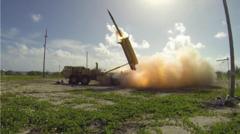The US Department of Defense has taken a significant step by dispatching the Terminal High-Altitude Area Defense (Thaad) missile system to Israel in response to an Iranian missile strike earlier in October. The initiative aims to fortify Israel's air defense capabilities and safeguard against further threats. President Joe Biden underscores the deployment's primary objective is "to defend Israel," particluarly as tensions persist following an Iranian assault involving 180 ballistic missiles on October 1.
The Thaad deployment involves approximately 100 US troops stationed in Israel, marking a noteworthy expansion of US military involvement in the region. This move raises questions regarding the adequacy of Israel's existing missile defense systems, such as the Arrow 2 and Arrow 3, which are co-developed with the US and have shown mixed success in recent interceptions.
While Thaad is highly effective against ballistic missile threats, with each system costing around $1 billion, its presence in Israel may also reflect Washington's concerns over the possibility of Israel executing more aggressive retaliatory measures against Iran, despite the US administration's emphasis on restraint and diplomatic resolutions.
The Iranian attack resulted in casualties in the West Bank and damage to key Israeli military installations, highlighting gaps in existing defenses. Damage assessment and satellite imagery indicate significant impacts in areas critical to Israeli military operations, including near the Mossad headquarters in Tel Aviv.
Political discourse in the US frames the deployment within the context of unwavering support for Israel, juxtaposed against diplomatic efforts to curb regional escalation. This posturing indicates a strategic pivot in US foreign policy as it balances between deterrence and de-escalation.
Iran's response to the Thaad deployment is cautious, with Iranian officials warning against increasing US military presence in the sensitive region. This escalating military dynamic raises the stakes in an already volatile Middle Eastern theater, with potential risks of broader armed conflict.
The decision to enhance Israel's missile defenses with a US-operated Thaad system illustrates the intricate and multifaceted nature of US-Israeli relations, especially amidst growing geopolitical uncertainties in the Middle East.
The Thaad deployment involves approximately 100 US troops stationed in Israel, marking a noteworthy expansion of US military involvement in the region. This move raises questions regarding the adequacy of Israel's existing missile defense systems, such as the Arrow 2 and Arrow 3, which are co-developed with the US and have shown mixed success in recent interceptions.
While Thaad is highly effective against ballistic missile threats, with each system costing around $1 billion, its presence in Israel may also reflect Washington's concerns over the possibility of Israel executing more aggressive retaliatory measures against Iran, despite the US administration's emphasis on restraint and diplomatic resolutions.
The Iranian attack resulted in casualties in the West Bank and damage to key Israeli military installations, highlighting gaps in existing defenses. Damage assessment and satellite imagery indicate significant impacts in areas critical to Israeli military operations, including near the Mossad headquarters in Tel Aviv.
Political discourse in the US frames the deployment within the context of unwavering support for Israel, juxtaposed against diplomatic efforts to curb regional escalation. This posturing indicates a strategic pivot in US foreign policy as it balances between deterrence and de-escalation.
Iran's response to the Thaad deployment is cautious, with Iranian officials warning against increasing US military presence in the sensitive region. This escalating military dynamic raises the stakes in an already volatile Middle Eastern theater, with potential risks of broader armed conflict.
The decision to enhance Israel's missile defenses with a US-operated Thaad system illustrates the intricate and multifaceted nature of US-Israeli relations, especially amidst growing geopolitical uncertainties in the Middle East.


















